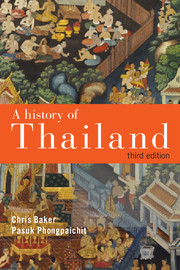Book contents
- Frontmatter
- Contents
- Illustrations
- Preface
- Abbreviations
- Glossary
- Chronology
- 1 Before Bangkok
- 2 The old order in transition, 1760s to 1860s
- 3 Reforms, 1850s to 1910s
- 4 Peasants, merchants, and officials, 1870s to 1930s
- 5 Nationalisms, 1910s to 1940s
- 6 The American era and development, 1940s to 1960s
- 7 Ideologies, 1940s to 1970s
- 8 Globalization and mass society, 1970s onwards
- 9 A political society, 1970s onwards
- Postscript: The strong state and the well-being of the people
- Notes
- Reigns and prime ministers
- Glossary of names
- Readings
- Index
9 - A political society, 1970s onwards
Published online by Cambridge University Press: 05 August 2014
- Frontmatter
- Contents
- Illustrations
- Preface
- Abbreviations
- Glossary
- Chronology
- 1 Before Bangkok
- 2 The old order in transition, 1760s to 1860s
- 3 Reforms, 1850s to 1910s
- 4 Peasants, merchants, and officials, 1870s to 1930s
- 5 Nationalisms, 1910s to 1940s
- 6 The American era and development, 1940s to 1960s
- 7 Ideologies, 1940s to 1970s
- 8 Globalization and mass society, 1970s onwards
- 9 A political society, 1970s onwards
- Postscript: The strong state and the well-being of the people
- Notes
- Reigns and prime ministers
- Glossary of names
- Readings
- Index
Summary
The massive economic and social changes begun in the American era spilled into politics over the last quarter of the 20th century.
After 1976, the senior bureaucracy, palace, and military still clung to the model of a passive rural society that accepted the hierarchical social and political order, and that needed to be protected against both communism and capitalism. The generals and bureaucratic elite laid plans to engineer social harmony and guide ‘democracy’ from above. But economically and culturally, the country was rapidly becoming more urban than rural, more dominated by business than bureaucracy, and more assertive than passive. The paternalist vision was swept away by the advance of industrialization, urbanization, and globalization, and the growth of mass society.
Through the 1980s, business politicians inside the parliamentary system, and a new ‘civil society’ outside it, pushed the military back towards the barracks, but reluctantly, slowly, and incompletely. An attempt to halt this trend during 1991–92 proved to be a critical transition. Thereafter, the military’s role declined steeply. Political spaces widened. High expectations arose for wide-reaching changes aided by the forces of globalization and the new assertiveness in parts of mass society. The political forces that prioritized the well-being of society and nation seemed set to flourish in the broader political space. But the traditions of the strong dictatorial state had been deeply embedded. When big business and a rural-based populism made a bid to sweep away the old bureaucrat-dominated state, it unleashed a conflict that brought the military back to the front line and placed both liberal democracy and economic growth in peril.
- Type
- Chapter
- Information
- A History of Thailand , pp. 235 - 281Publisher: Cambridge University PressPrint publication year: 2014



